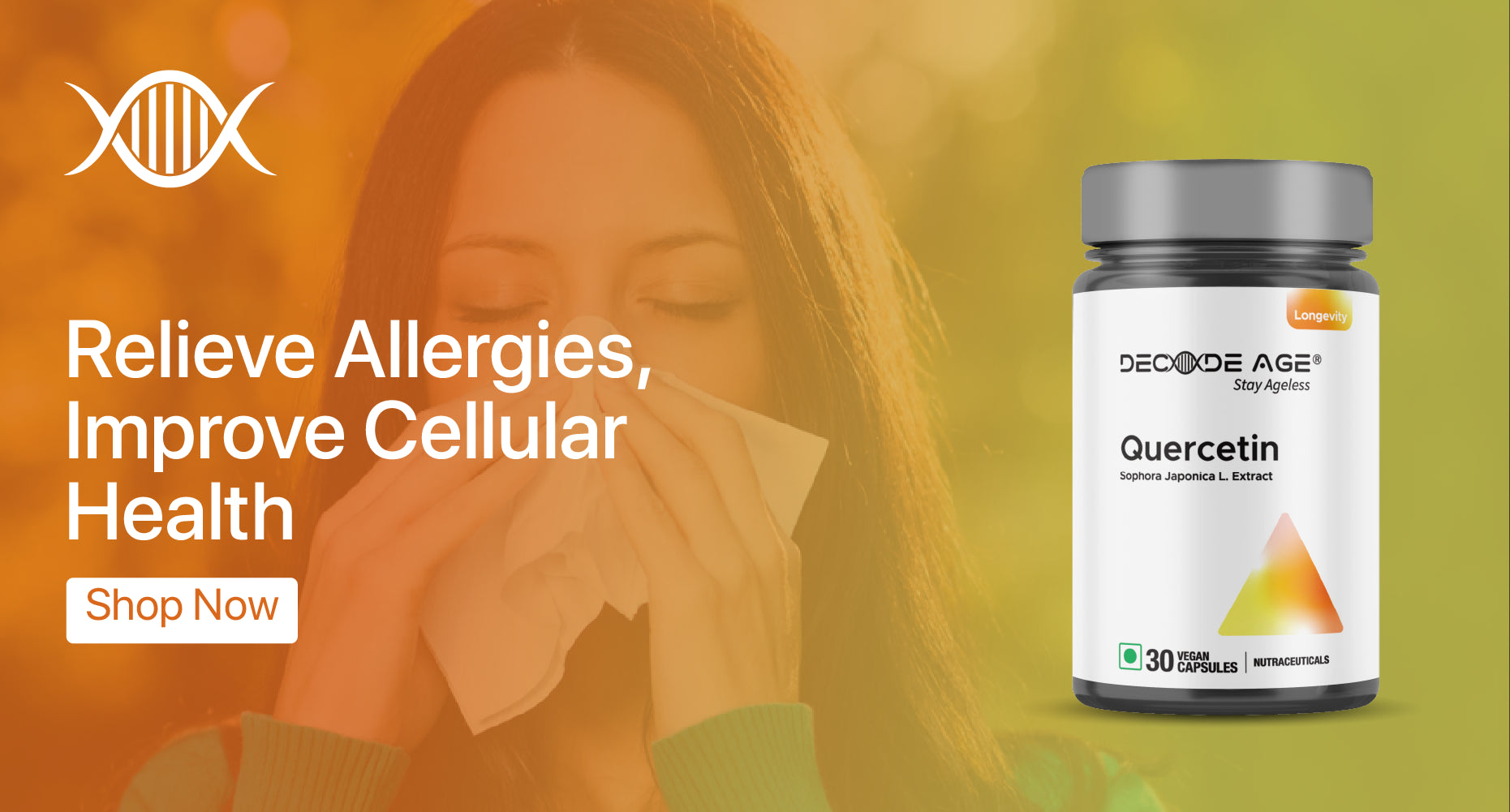Quercetin, present in numerous fruits and vegetables or accessible as a supplement, serves as a robust supporter of health. It fights inflammation and counteracts harmful free radicals within the body, thereby bolstering general well-being. Furthermore, Quercetin boosts immune function, hinders the proliferation of cancer cells, and supports cardiovascular health by diminishing blood pressure and cholesterol levels. Moreover, it provides neuroprotective advantages, possesses antimicrobial characteristics, and assists in controlling blood glucose levels. Additionally, Quercetin aids in maintaining cellular health by facilitating the elimination of senescent cells, potentially postponing the onset of ageing and diseases.
Health Benefits of Quercetin
Potential Health Benefits of Quercetin Supplement include:
Potent Senolytic Activator
Quercetin is recognised as a senolytic agent, aiding in the elimination of senescent cells that accumulate over time and play a role in age-related diseases. It achieves this by activating cellular pathways that induce apoptosis, or programmed cell death, selectively in these senescent cells. By promoting the clearance of these dysfunctional cells, Quercetin has the potential to enhance tissue well-being and lifespan, highlighting its significance in research on ageing and senescence.
Antioxidant Properties
Quercetin acts as a powerful antioxidant; it helps neutralise harmful free radicals within the body. By reducing oxidative stress, Quercetin potentially shields cells from the effects of ageing, inflammation, and exposure to environmental toxins.
Anti-Inflammatory Effects
Quercetin has been shown to exhibit anti-inflammatory properties by blocking the generation of inflammatory substances like cytokines and prostaglandins. Since chronic inflammation is prevalent in numerous age-related conditions, Quercetin's anti-inflammatory properties could potentially slow down their advancement.
Cardiovascular Health
Quercetin has been associated with several cardiovascular advantages, such as decreased blood pressure, enhanced endothelial function, and reduced heart disease risk. Its antioxidative and anti-inflammatory characteristics likely play a role in these benefits, shielding blood vessels from oxidative damage and inflammation.
Brain Health and Cognitive Function
Certain studies indicate that Quercetin could support brain health and cognitive function, potentially lowering the likelihood of age-related cognitive decline and neurodegenerative conditions like Alzheimer's disease. Quercetin's antioxidant and anti-inflammatory properties may play a role in shielding neurons from harm and fostering overall brain well-being.
Immune System Support
Quercetin has been demonstrated to regulate the immune system by boosting the performance of immune cells and diminishing inflammation. Through enhancing immune function, Quercetin aids in shielding the body from infections, alleviating allergies, and promoting general well-being, a crucial aspect especially with advancing age when immune efficiency tends to decrease naturally.
Potent Anti-Cancer Properties
Research has explored the potential anticancer attributes of Quercetin, suggesting that it may inhibit the growth and spread of cancer cells. Its antioxidative and anti-inflammatory properties are believed to contribute to cancer prevention by diminishing oxidative stress, inflammation, and DNA damage linked to cancer progression.
Metabolic Health
Quercetin's potential benefits extend to metabolic well-being, potentially mitigating insulin resistance, enhancing glucose metabolism, and reducing cholesterol levels. These effects could aid in the prevention or management of age-related metabolic conditions like type 2 diabetes and obesity.
Skin Health
Research has explored the potential advantages of Quercetin for skin well-being, such as shielding against UV-induced harm, lessening inflammation, and fostering wound recovery. These attributes could aid in preserving youthful skin and averting age-related skin issues.
Recommended Dosage and Timing:
It is advised to take one capsule of Decode Age Quercetin Supplement daily at midday. This supplement is generally safe for individuals with various conditions, such as high blood sugar, hypertension, and high cholesterol.
Is It Naturally Sourced?
Decode Age Quercetin, sourced from Sophora Japonica L., is a natural extract known for its safety and health-promoting properties.
Does Decode Age Quercetin Aid Allergies?
Quercetin's antihistamine properties may alleviate allergy symptoms by inhibiting inflammatory mediators, potentially benefiting conditions like hay fever and asthma.
Can I Take Quercetin?
- Health Conditions: If you have underlying health conditions or are on medication, it's essential to consult with a healthcare provider before starting Quercetin.
- Pregnancy and Breastfeeding: There is limited research on Quercetin's effects during pregnancy and breastfeeding. It's advisable to avoid Quercetin supplementation during these periods.
- Age Factor: Quercetin is primarily researched for its benefits in ageing. Young individuals, especially those under 18, should consult a healthcare provider before use.
Conclusion
Quercetin, a potent flavonoid, provides a wide range of health benefits by exerting anti-inflammatory, antioxidant, and senolytic properties. It assists in managing allergic responses and decreasing persistent inflammation, consequently improving tissue health and overall well-being.
References
Health benefits of quercetin in age-related diseases.
(Deepika, & Maurya, P. K. (2022). Health benefits of quercetin in age-related diseases. Molecules, 27(8), 2498.)
The Potential Benefits of Quercetin for Brain Health: A Review of Anti-Inflammatory and Neuroprotective Mechanisms.
(Chiang, C., Tsai, Y., & Wang, J. (2023). The Potential Benefits of Quercetin for Brain Health: A Review of Anti-Inflammatory and Neuroprotective Mechanisms. International Journal of Molecular Sciences, 24(7).)
FAQs
1) Is Decode Age Quercetin Safe?
Decode Age Quercetin is generally considered safe for most individuals, including those with conditions like high blood sugar, hypertension, and high cholesterol.
2) Does Quercetin help with Allergies?
Yes, Quercetin possesses antihistamine properties that could potentially relieve allergy symptoms by inhibiting the release of histamines and other inflammatory mediators responsible for reactions such as sneezing, itching, and congestion. By regulating immune system responses, Quercetin has the potential to lessen the occurrence and intensity of allergic episodes, thereby offering possible benefits for conditions like hay fever and asthma management.
3) Is Decode Age Quercetin a Natural Extract?
Decode Age Quercetin is sourced from Sophora Japonica L., a plant recognised for its abundant Quercetin levels found in its bark, leaves, and blossoms. Utilised extensively in dietary supplements and herbal concoctions, extracts from Sophora Japonica offer various health benefits, primarily due to their high Quercetin concentration. The inherent health-promoting attributes of the plant are effectively captured through a natural extraction method, ensuring the potency of Decode Age Bioactive Quercetin.
4) Is Quercetin a Blood Thinner?
Quercetin combined with anticoagulants may potentially function as a blood thinner. This combination is commonly found in supplements aimed at promoting heart health, managing inflammatory responses, and alleviating pain. If you have concerns regarding this particular side effect, consider seeking out Decode Age Quercetin supplements that do not contain anticoagulants, or consult with your healthcare provider for personalised advice.























Leave a comment
All comments are moderated before being published.
This site is protected by hCaptcha and the hCaptcha Privacy Policy and Terms of Service apply.